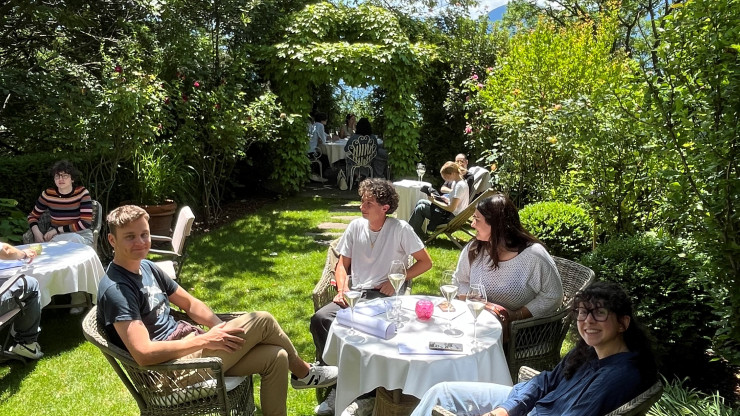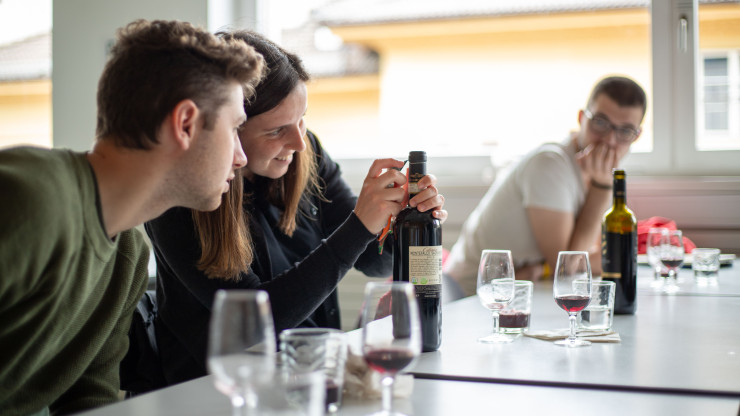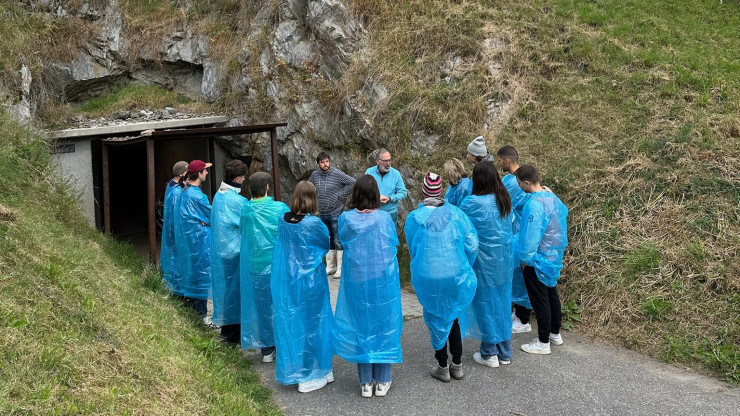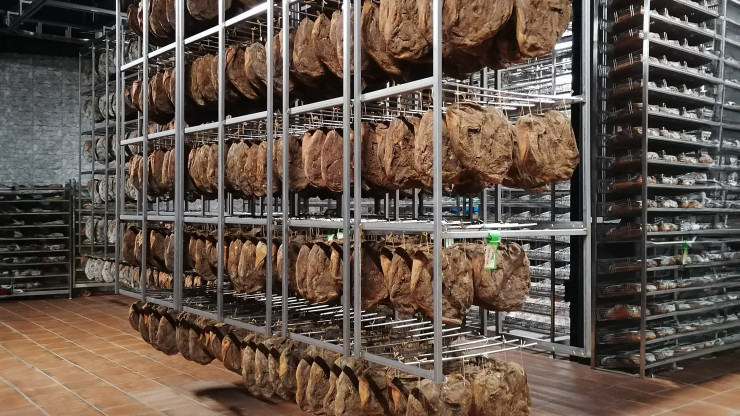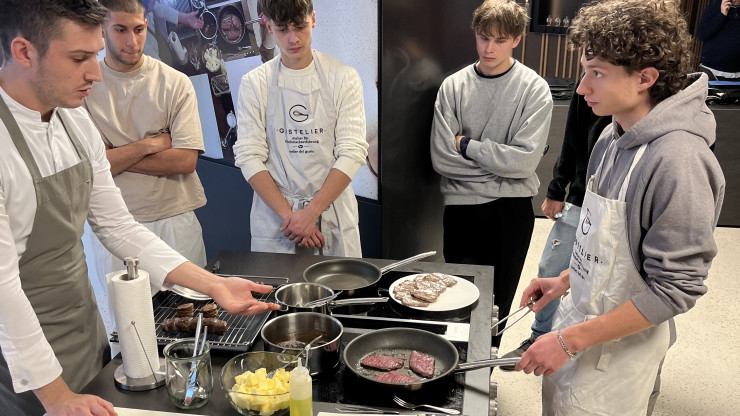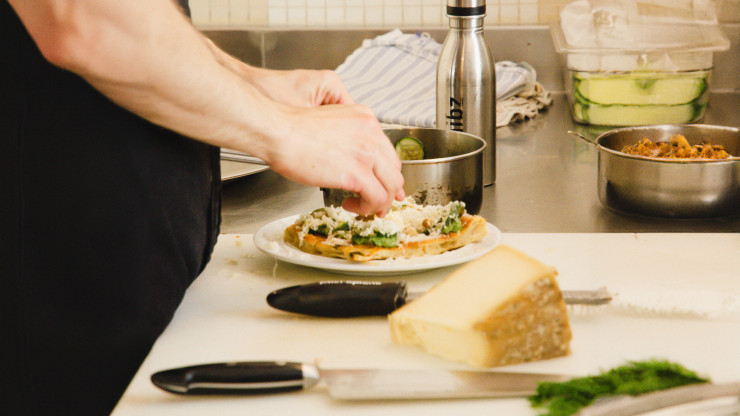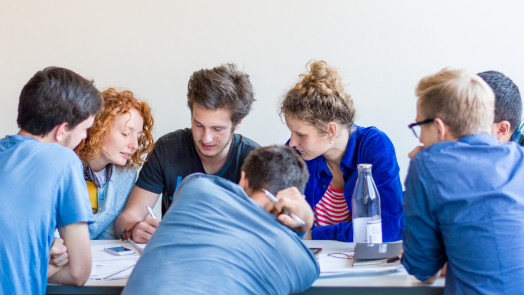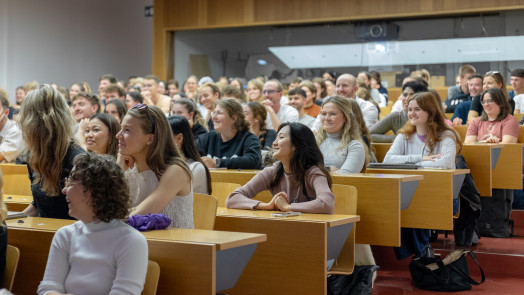Bachelor in
Food and Enogastronomy Sciences
Become an expert in the world of food and gastronomy, where tradition, innovation and sustainability come together to create the future of food
Course Description
This multidisciplinary programme, developed together with chef Norbert Niederkofler, offers a unique international learning experience, which “starts from the field and arrives at the table”, providing technical and theoretical expertise on quality, technology, health and food safety, and the cultural enhancement of food products. unibz offers a multicultural and dynamic environment in the heart of the Alps, an area renowned for its excellent food and wine.
Students receive a multidisciplinary and comprehensive training and acquire scientific, technological, cultural and economic skills to address all stages of food production, from cultivation to breeding and processing, with an integrated and sustainable approach. Emphasis is placed on innovative food technologies, quality management, food safety, waste reduction and the promotion of local gastronomic traditions with a particular attention to the sustainable development of the territory. We train young professionals to develop new food products and reinterpret traditional specialities through innovation and the principles of the circular economy, through a variety of practical activities carried out during the course, in workshops, internships and study trips.
Special scholarships from the Municipality of Meran-Merano
The Municipality of Meran-Merano will award 5 scholarships of € 1,000 each to students enrolled in the first year of this study programme in the 2023/24 academic year, of which four scholarships will be awarded to students resident in the municipality of Meran-Merano. If there are no applicants for the scholarships reserved for residents of the municipality of Meran-Merano, the scholarships will be awarded according to the general ranking list.
At a glance
Bachelor class: L-26
ECTS credits: 180
Duration of the course: 3 years
Courses will be taught in English, Italian and German (trilingual)
Places available: 50 EU + 4 Non-EU
Campus: Bozen-Bolzano
Tuition fees: ca. € 1200 per year
Structure
The three-year programme includes a common first year with basic courses in mathematics, chemistry, biology, physics, computer science, agricultural science, law and marketing. From the second year, students can choose to specialise in one of two majors:
- Food Technology: with a focus on production processes, quality control and food safety
- Enogastronomy: with a focus on the valorisation of local food and wine productions
Typical subjects then include food technology and microbiology, oenology, nutrition, sensory analysis and food protection, with an emphasis on safety, innovation and sustainability. In addition to optional courses for postgraduate study, there are internships and a final exam.
Part-time enrolment
Part-time enrolment
Part-time enrolment allows you to reduce your study load, giving you more time for other activities such as work, sports, or personal or familiar commitments. You will take a reduced number of courses per year while still having access to all the services provided by the university. Students choose this option after enrollment (in October) and not during the application (subject to approval by the ministry).People
Degree Course director: Prof. Emanuele Boselli
Student Representative in the Course Council: Emma Serato
Exchange Programmes and Internships
The faculty offers exchange programmes with universities all over the world and unibz is part of a large network of collaborations with employers in Italy and abroad where you can undertake your mandatory internships.
Hands-on Experience
Career Opportunities
Graduates will be ready to work in agri-food businesses, the food and wine industry, the catering sector and tourism, in quality control, the development of new products and the promotion of local food and wine heritage. They will be able to collaborate in the management of production processes, promote sustainability and apply innovative methods to improve food quality and safety, with a view to creating territorial alliances based on food and wine culture.
In addition, graduates can continue their studies with a master in food technology sciences. The course prepares students to sit the State Examination to gain access to the National Register of Chartered Agronomists and Foresters Junior (Section). The trilingual degree also opens international career opportunities.

Michaela von Lutz
Strategic Buyer - Alois Dallmayr KG, München
”Companies in the food industry are eager to recruit graduates of this bachelor programme. This unique academic background equips candidates with a holistic perspective that encompasses product and business development, food culture, production methods, ethics, and communication. By valuing the intricacies of mountain areas, we expect these graduates to contribute to the diverse expertise of the team, fostering innovation and sustainable growth within the enogastronomy industry.”
Studying at unibz
Living in South Tyrol, Housing, Scholarships, Single Subject Courses and more
Coming to unibz from Abroad
Everything you need to know as a degree-seeking applicant or as an incoming exchange student
Campus Tours
Book an appointment with our Student Ambassadors and get the opportunity to visit the Bozen-Bolzano campus or the NOI Techpark Bozen-Bolzano campus (Faculty of Engineering) and gain an insight into your future student life.
The visits will take place from 7 July to 29 August 2025 from Monday to Friday in the afternoon.
We offer 60-minute slots every day, which you can book directly online here: unibz Campus Tours | Bozen-Bolzano.
Each individual appointment includes:
- an advice session with a Student Ambassador,
- a guided tour of the campus (library, Aula Magna, laboratories, canteen, workshops...)
Application and Admission
You can find all you need to know in order to apply and gain admission to this study programme by browsing through the information below.
Subject to accreditation of the Ministry.
Early Bird Application
Application: 03/03 - 06/05/2025 (by noon local time)
Language exams (online): 17/03/2025 (registration: 03 – 09/03/2025) and 16 - 17 and 22 - 23/04/2025 (registration: 24/03 – 08/04/2025)
Publication of ranking lists: by 27/05/2025
Payment of the 1st instalment of the tuition fees: by 05/06/2025 (by noon local time)
Enrolment: from 11/07 - 05/08/2025 (by noon local time)
Late Application (only for EU citizens)
Application: 28/05 - 09/07/2025 (by noon local time)
Language exams (online): 23 - 27/06/2025 (registration: 28/05 – 15/06/2025)
Publication of ranking lists: by 29/07/2025
Payment of the 1st instalment of the tuition fees: by 05/08/2025 (by noon local time)
Enrolment: from publication of the ranking list until 05/08/2025 (by noon local time)
Additional Application Session (only for EU citizens)
The faculty can open additional application sessions for single study programmes in August and in September if there are available places. More information on additional sessions will be published in due course.
Preparatory courses and Freshers Days
Intensive language courses: 01 - 19/09/2025 (Monday to Friday, 6 h/day)
Mathematics pre-course: 22/09 - 03/10/2025
Freshers Days: 29 - 30/09/2025
1st semester
Classes: 29/09 - 23/12/2025
Exams (extraordinary session): 11 - 23/12/2025
Holidays: 24/12/2025 - 06/01/2026
Classes: 07 - 24/01/2026
Exams: 26/01 - 21/02/2026
2nd semester
Classes: 02/03 - 02/04/2026
Holidays: 03 - 06/04/2026
Classes: 07/04 - 13/06/2026
Exams (extraordinary session): 14 - 23/05/2026
Exams: 15/06 - 11/07/2026
Autumn session
Exams: 24/08 - 26/09/2026
EU citizens and citizens given parity of treatment
Early Bird Application: 40
Late Application: 10
Non-EU citizens (living abroad)
Early Bird Application: 4
To gain admission to the programme you need one of the following qualifications:
- a secondary school leaving certificate (Italian system)
- equivalent qualification obtained abroad.
Foreign school leaving certificates are considered equivalent if obtained after 12 years of education. In this case, you furthermore must have attended at least the last two years in the foreign school system (e.g. Irish Leaving Certificate: it is not enough to attend one year and obtain the foreign certificate).
The Italian Ministry of Education, University and Research has set specific admission requirements for holders of certain certificates (e.g. American high school diplomas, British and Greek certificates). For more information: apply@unibz.it (Advisory Service).
To be admitted, you must fulfil the language requirements indicated in the section “Language requirements”.
According to national regulations, simultaneous enrolment in a maximum of 2 programmes is possible (however, the two programmes must not belong to the same class, e.g., L-18/L-18 and must differ for at least 2/3 of the course contents).
The official teaching languages are German, Italian and English. Therefore, the following language requirements apply, otherwise you will be excluded from the admission procedure:
Entry level (to gain admission)
1st language: B2
2nd language: B1
3rd language: no level required
Preference will be given to candidates with a B2 level in their 2nd language. A B1 level in the third language is the minimum requirement for taking curricular examinations in that specific language.
Exit level (to graduate)
1st language: C1
2nd language: B2
3rd language: B2
The levels of the Common European Framework of Reference apply.
Your first language is the language in which you have the highest level of proficiency (B2 or C1). Your third language is instead the language in which you are weaker (or in which you are an absolute beginner).
You can demonstrate your language proficiency in the application portal (in the section “upload language certificates” and/or “enrol for language exams”) after you have created an application in the section “create/manage applications”. The certification is mandatory for the first and second language, for the third language it is recommended (from B1 onwards).
- In case your final certificate has been awarded by an Italian public institution, you need to submit a self-declaration.
- In case your final certificate has been awarded by a foreign public institution, you need to upload diploma scanned copy of the original.
You can demonstrate language proficiency through:
- the main teaching language in your final high school year if German, Italian or English (recognised as C1) (Ladin upper secondary schools: recognised as B2 in German and Italian). Foreign qualifications: If the main teaching language is not clearly stated on your hign school diploma, please also upload a letter/document issued by your high school stating the medium of instruction.
- a bachelor or master degree in Italian, German or English (recognised as C1). unibz graduates must upload the language certificates obtained and/or declare that they have passed language exams at the unibz Language Centre (B2, B2+ or C1) Foreign qualifications: If the teaching language is not clearly stated on your University degree, please also upload a letter/document issued by your University stating the medium of instruction during your studies.
- a recognised language certificate (see the list of recognised certificates) If you cannot upload the certificates, you can send them by e-mail as PDF files or deliver them in person to the Language Centre by the application deadline (see “Deadlines” section).
- language exams organised by the unibz Language Centre. You can register for these exams online through the application portal (in the section “enrol for language exams”) after you have filled out your application in the section “create/manage applications”. The registration periods are indicated in the "Deadlines" section. If you start your application outside a language exams registration period, you must return to the portal during one of the periods indicated above in order to register for an exam. Information regarding the structure of the language proficiency exams, their duration, their administration, and typical processing time for the publication of the results can be found on the following webpage.
Please note that you can only register for B1 and B2 level exams and only for one level per language (e.g. in the same exam session you can register for a B1 German and a B2 Italian exam, but not for a B1 and a B2 German exam).
For information on studying in three languages also visit the following page.
Secondary schools in a foreign country/Bi- or multilingual schools
If the foreign language proficiency levels (for German, Italian, or English) are explicitly indicated on the diploma of graduation according to the Common European Framework of Reference (i.e., B1, B2 or C1), and if all four language abilities (reading, listening, speaking, writing) have been assessed, then the indicated levels will be accepted as a proof of proficiency for the second and/or third language.
Please upload your school-leaving certificate to the application portal in the section “upload language certificates” under the respective language. The Language Centre will decide on its recognition.
Third language/Intensive language courses in September
If you have already acquired a language certificate in the third teaching language, please upload it to the portal. If you are not able to certify your language competence in the third language and you are admitted to unibz, you will have to take a placement test. You will receive further information about the test by e-mail. Based on the result of the placement test, you will be assigned to a certain learning path so that you will be able to reach level B2 as soon as possible.
If you are an absolute beginner in the third language, or if you have a level below B2, you may attend a three-week intensive language course during the pre-semester session in September in order to start the learning path.
The dates of the extensive courses are indicated in the “Deadlines” section. Beginner courses (A1) will be offered exclusively during the pre-semester intensive course session in September will no longer be offered during the academic year. Therefore, absolute beginners should start their learning path for the third language by attending the intensive courses in September.
There will be extensive courses (4 hours per week) during the semesters and intensive courses (8 hours per week) during the time between semesters.
The language courses offered by the Language Centre are free of charge and aim to help the students reach the following target levels in the third language:
- B1 level by the end of the 1st year;
- B2 level by the end of the 2nd year.
Your application must be submitted online through the Application Portal. The deadlines are indicated in the “Deadlines” section.
- You need to create an account and upload a valid ID card or passport (front/back). Please note: if your document is invalid, incomplete or unreadable, you will be excluded from the admission procedure;
- Fill in the online form and upload the attachments listed under “Admission procedure”;
- If you gained your qualification abroad, you must also upload the diploma of your qualification: if you are not yet in possession of the diploma, you’ll need to upload it upon enrolment;
- Complete and submit the online application by the deadline. Once the application has been sent, it cannot be modified. Filled-in forms which have not been sent correctly will not be taken into consideration.
Please note: Mendacious declarations will be criminally prosecuted and will result in the automatic exclusion from the ranking list.
EU-Citizens and equivalent
You might apply for more than one study programme. If you are excluded in the first session, you might apply again in the second one.
Considered as equivalent are:
- Citizens from Norway, Iceland, Liechtenstein, Switzerland, San Marino and the Vatican City State;
- Non-EU citizens with a valid permit to stay in Italy (see article 39, paragraph 5 of decree no. 286 of 25.07.1998: "permesso di soggiorno" (residence permit) for work, family reasons, political or humanitarian asylum, religious reasons). In this case, you apply directly to the University as described above and must submit a copy of your valid permit to stay. A permit to stay for study reasons or a visa for tourism is not sufficient. If the permit has expired, you must attach a renewal request.
Please note that if you do not upload the permit in the application portal, you will be automatically considered a non-EU citizen living abroad and therefore subject to the admission procedure through the Italian authorities in your country of origin.
Non-EU-Citizens (living outside of Italy)
Only one application period is offered. After the deadline it is not possible to apply anymore. Application fee: € 50. The fee is an administration fee and is non-refundable.
Once the ranking list has been published, if you have gained admission, secure it by paying the first instalment and then start your visa application on the Universitaly portal. The application on Universitaly is mandatory, otherwise you will not be allowed to enrol. On Universitaly you can apply for one study programme only.
In addition to language skills and the other requirements mentioned above, the selection procedure is based on the following criteria.
Candidates can obtain a maximum of 15 points:
- up to 5 points for the average of the grades obtained in the third-last and penultimate year of upper secondary school. Grades in behaviour, religion and physical education will not be taken into account.
- up to 5 points for the average of the mathematics grades
- up to 5 points for the average of biology, physics and chemistry grades
The evaluation procedure is based exclusively on the documents submitted by the candidate when submitting the application via the relevant portal. The documentation relating to the school curriculum may be submitted in one of the languages in which the course is taught.
In the application portal, you shall:
- enter, by means of self-certification, the final grades obtained in the subjects of the third last and penultimate year of secondary school. Warning: False declarations will be punished by law and will result in exclusion from the admission ranking. Those who have completed the relevant years abroad must upload a copy of the relevant report cards* to the portal;
- upload, if necessary, the official translation of the report cards into Italian, German or English;
(*) In the event that the prospective student fails to indicate the final grades of the third-last and penultimate year of upper secondary school, the Commission will assign a final grade equal to the pass mark to the school year for which the prospective student has not produced any certification.
(*) In the case of candidates from schools whose system differs from the Italian one and who do not have report cards for the third last and/or penultimate year of high school, the Commission reserves the right to evaluate any high school report cards provided by the candidate for school years other than the penultimate and third last.
The commission will only consider the documents uploaded to the portal by the application deadline. Candidates must upload the required documents to the admission portal, under penalty of automatic exclusion from the process.
Rankings
The ranking is determined based on the score obtained in the evaluation. In the event of a tie, priority is given to the youngest candidate. The rankings are published at this page and are valid only for the academic year for which they were drawn up.
Additional educational requirements
For this programme an adequate initial preparation in mathematics, physics, chemistry and biology is required. Initial preparation is verified through school records. If the commission deems the initial preparation to be incomplete, it may assign training obligations (OFA) to be fulfilled in the first year of the programme.
To be admitted to the course without being assigned OFA, a minimum grade point average of 3 must be achieved in mathematics and a minimum grade point average of 3 must be achieved in biology, physics and chemistry:
- students who obtain 3 points or less for the evaluation of the average grade in mathematics are assigned additional training obligations in Mathematics.
- students who obtain 3 points or less for the evaluation of the average grade in biology, physics and chemistry are assigned additional training obligations in Chemistry.
The additional learning requirements are fulfilled by passing a specific exam. Additional courses are offered to review basic concepts in mathematics and/or chemistry. Students who do not fulfil the additional learning requirements within the first year can enrol in the second year of study, but will not be able to take exams in the second and third years of study.
If you have been admitted to more than one study programme, you can secure your admission for a maximum of 2 programmes by paying the designated rate twice.
1. Choose the study programme and pay the fees (to secure your admission) in the application portal.
The deadlines are indicated in the “Deadlines” section.
If you do not meet this deadline, you will automatically be excluded and the next applicant in the ranking list will be admitted.
For EU citizens and citizens given parity of treatment only: any remaining places of the early bird application, will be offered in the late application.
Please note: Paying university fees does not confer student status, which is only obtained by enrolling. If you pay but do not enrol, you are not entitled to a refund unless you do not pass your secondary school final exam or, in the event of non-EU applicants living abroad, you do not obtain the necessary documents for enrolment from the Italian authorities in your country.
2. Enrol online in the application portal.
The deadlines are indicated in the “Deadlines” section.
Enrolment is recommended as early as possible, so you have the possibility to upload incomplete documents before the deadline.
If you do not meet the enrolment deadline, you will be excluded and the next applicant in the ranking list will be admitted.
Students intending to transfer from another Italian University to unibz have to submit to the Student Office - at the beginning of the academic year - a copy of the transfer application presented at the university of provenance.
3. If you have a foreign secondary school qualification, during enrolment you need to upload these documents:
- your secondary school diploma
- an official translation of the diploma into Italian (not necessary for diplomas issued in German or English)
Depending on the foreign education system your qualification belongs to, you must also upload:
a) EU countries, Switzerland, Norway, Iceland, Liechtenstein, International Baccalaureate, European Baccalaureate:
- Statement of Correspondence of your secondary school diploma, to be downloaded from the ARDI – Automatic Recognition Database – Italy
b) non-EU countries that are signatories to the Lisbon Convention:
- Statement of Correspondence of your secondary school diploma, to be downloaded from the ARDI – Automatic Recognition Database – Italy and
- Statement of Verification of your secondary school diploma, issued by the Italian Information Centre on Academic Mobility and Equivalence (CIMEA)
c) non-EU countries that are not signatories of the Lisbon Convention:
- Statement of Comparability of your secondary school diploma, issued by the Italian Information Centre on Academic Mobility and Equivalences (CIMEA) and
- Statement of Verification of your secondary school diploma, issued by the Italian Information Centre on Academic Mobility and Equivalence (CIMEA)
unibz performs the necessary checks on your foreign qualification and in case of doubt reserves the right to request additional documents.
Please note that if you do not possess a valid admission qualification, you can be excluded with Rector’s decree even after enrolment.
If you are a non-EU citizen living abroad:
Once you are eligible for admission (check the ranking lists) and have also applied on Universitaly, the Italian Authorities in your own country will issue you the entry visa for studies/university. This will allow to enrol for the study programme that you have applied for.
According to Italian law, within 8 working days of your arrival in Italy, you must have applied for the residence permit: as soon as you arrive, get in touch with the Advisory Service and you will be given the necessary information for starting the procedure.
Once you will obtain your residence permit (permesso di soggiorno), you have to hand it in at the Student Office personally or via e-mail.
Fees amount to € 1200
- 1st instalment (€ 600): includes the revenue stamp of € 16.
- 2nd instalment (€ 600): must be paid by March of the following year
Delayed payment of the second instalment will result in a fine being levied. If you have not paid the tuition fees, you will be unable to take exams and will not be able to transfer to other universities or other study programmes.
If you drop out of a programme, interrupt your studies or are excluded from studies, you are not entitled to reimbursement of the fees.
Exemption from the tuition fees is granted to:
- Students with a disability recognized under article 3, paragraph 1, of Law No 104/1992, or with a disability up to or exceeding 66%: the disability certificate, issued by the health authorities, must be handed in at the beginning of the academic year.
- Foreign students who have been granted a scholarship from the Italian government.
Students who benefit from a scholarship granted by the Autonomous Province of Bozen-Bolzano are entitled to receive a refund of the tuition fees.
Credit points from previous university studies can only be recognised after enrolment if the exams taken at the university of provenance are equivalent in content to those offered at unibz. You can fill out the application after enrolment.
The Advisory Service provides support regarding your choice of study. In many cases a simple call or a short request is enough to get the relevant information (Tel. +39 0471 012100).
Study Course Page - Common Links - Agricultural, Environmental and Food Sciences
Credits
Photography: IDM / Sennereiverband Südtirol / Franco Cogoli

